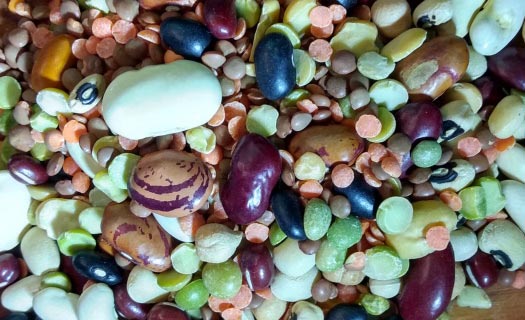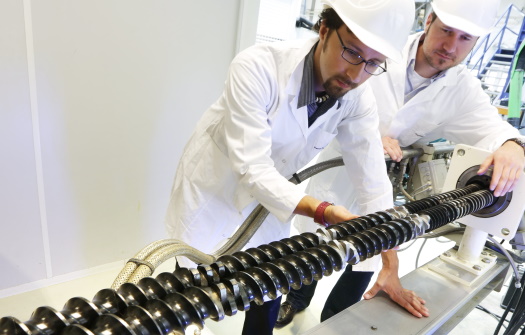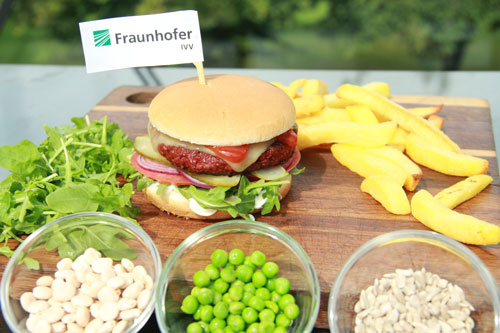What factors influence the taste and texture of plant-based meat substitutes?
Besides soy and gluten, other protein sources are now used for manufacturing plant-based alternatives to meat. In particular, the combination of different plant-based materials improves the structure, better imitating the fibrous and juicy texture of lean meat. It is important here to understand the behavior of the various protein fractions during the manufacturing process and interactions between the recipe components. This enables recipes to be optimized and customized for respective consumer preferences and demands.
Production process for plant-based meat substitutes
The extrusion cooking process allows ingredients to be simultaneously mixed, kneaded and rapidly heated under pressure. Formulations with a high protein content are being used to make extrudates having a meat-like texture. Conventional extrusion processes use raw masses having a low moisture content. This produces granulates which, after rehydration, can be used as a substitute for minced meat in foods. However, when raw masses having a very high water content are cooked in the extrusion process and then cooled prior to exiting the nozzle in a laminar flow the result is fibrous protein structures. This process allows the scientists at the Fraunhofer IVV to make extrudates with an elastic, meat-like texture. These are then customized with flavorings and herb/spice mixtures and processed into finished foods.
Commercialization of our tasty meat substitute products with support of our research
Scientists at the Fraunhofer IVV have many years of experience manufacturing protein ingredients and characterizing their technological properties. This allows suitable proteins to be selected for the meat substitute products. We have a state-of-the-art food pilot plant available for developing products. A highly specialized sensory panel is available to appraise the products. These vegetarian products, like conventional meat products, are moist and so have special hygiene requirements with regards to packaging and storage. Experts in packaging and product safety at the Fraunhofer IVV can provide full support in this area.
Our research passes to our spin-off company, endori Food GmbH & Co.KG, and leads to the production of market-ready meat surrogate products. Products have already been successfully introduced in Germany and Scandinavia with the brand name endori®.
Plant-based burger-patties are a special challenge
Whilst wet-extruded textured proteins have a structure akin to muscle fiber, dry extrudates have a more porous and harder structure. On rehydration they become like minced meat and are very suitable for making meat-free burger-patties. The quality of a plant-based burger is generally appraised by the extent to which its taste compares to a traditional minced meat burger. Although plant-based burgers naturally contain no meat, consumers demand that they appear and taste like meat burgers. On being fried the plant-based patties must retain their structure and not fall apart. Also, during the cooking the color must change from red to brown. Ready-to-eat plant-based patties must be juicy and have firmness of bite.
Our in-depth experience has given us a detailed understanding of the properties of different plant-based proteins. A customized combination of raw materials and specific control of the extrusion process enables us to tailor the taste, texture, and biological quality of the end products. Key parameters during the extrusion process are, for example, the screw configuration, nozzle geometry, speed, throughput, and temperature profile.
 Fraunhofer Institute for Process Engineering and Packaging IVV
Fraunhofer Institute for Process Engineering and Packaging IVV

